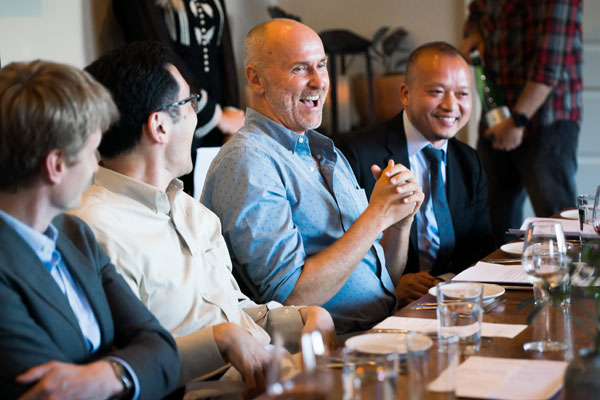On the Cusp: Straddling the Emotional & Physical Reality of a Prostate Cancer Diagnosis

A year ago, long-time San Franciscan and hospitality entrepreneur Chip Conley received a shocking diagnosis. While in New York for business, the Joie de Vivre Hospitality founder and Airbnb Strategic Advisor for Hospitality and Leadership learned that he had intermediate-stage prostate cancer.
"I wasn't prepared for it," says Conley. "And so when I heard about it on the phone while sitting in the gutter in Soho outside of a big dinner I was supposed to be at, it hit me like a ton of bricks."
"What I ended up doing is doing my Google search – and that led me down so many rabbit holes," he adds. Looking back, Chip says resources such as support groups or informational websites ultimately helped him digest his diagnosis and properly plan next steps.
As an advocate for 'mindful aging,' Chip has often spoken about the journey of tackling his diagnosis and further discovering his later-life purposes. "There is more and more research that shows people tend to get happier in their 50s, 60s, and 70s. This seems to be something that society doesn't know about because of this idea that you hit a midlife crisis, then have decrepitation, disease, and death. But there are a lot of unexpected pleasures of aging."
As people approach times in their lives where they may be more susceptible to developing diseases such as prostate cancer, a positive outlook and a support system that recognizes later-life complexities are imperatives. "When it comes to prostate health, or any kinds of diseases that [typically] happen later in life, I think you need to be aware of them and create a social crucible so that people feel supported during those times… I think that is a big part of any kind of disease diagnosis in midlife and beyond," Conley says.
On the health care side, this means that institutions can help educate the public on the risk of developing prostate cancer and other diseases, and what could be done to combat them. "What we all need is a little more education and communication around what things can actually influence prostate health – whether it's diet or other kinds of mindfulness practices," says Conley. "I think people see prostate disease as something that happens late in life, but there's a lot of populations who don't know how much risk they're at [for developing prostate cancer] at a younger age."
For Chip, his part has meant creating opening dialogue about his own experience with prostate cancer and to involve himself in advocacy. Plus, in his own journey with UCSF, he's thankful to be at a place where he and his physicians can "look at the natural history of my cancer" to determine what procedures and treatments are most appropriate.
